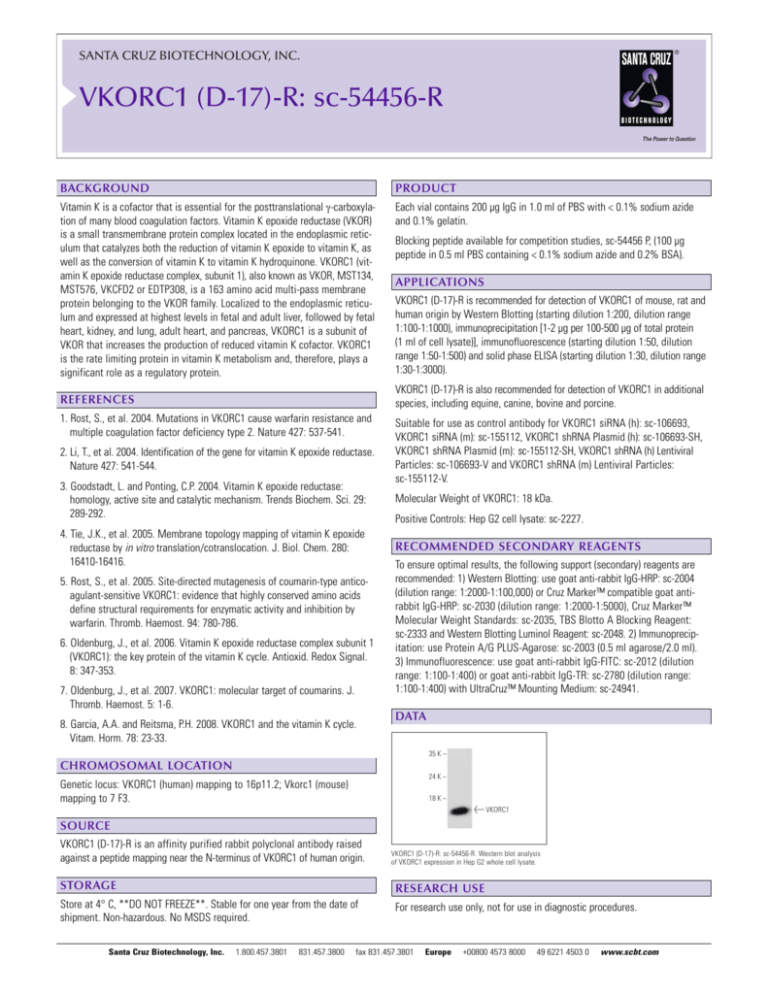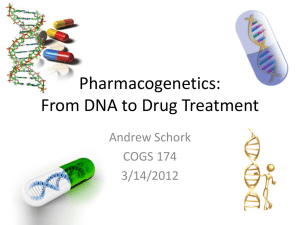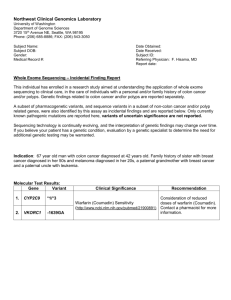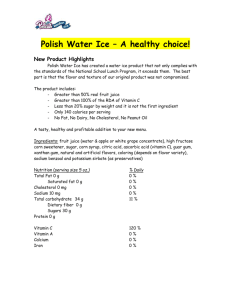VKORC1 (D-17)-R: sc-54456-R
advertisement

SANTA CRUZ BIOTECHNOLOGY, INC. VKORC1 (D-17)-R: sc-54456-R BACKGROUND Vitamin K is a cofactor that is essential for the posttranslational γ-carboxylation of many blood coagulation factors. Vitamin K epoxide reductase (VKOR) is a small transmembrane protein complex located in the endoplasmic reticulum that catalyzes both the reduction of vitamin K epoxide to vitamin K, as well as the conversion of vitamin K to vitamin K hydroquinone. VKORC1 (vitamin K epoxide reductase complex, subunit 1), also known as VKOR, MST134, MST576, VKCFD2 or EDTP308, is a 163 amino acid multi-pass membrane protein belonging to the VKOR family. Localized to the endoplasmic reticulum and expressed at highest levels in fetal and adult liver, followed by fetal heart, kidney, and lung, adult heart, and pancreas, VKORC1 is a subunit of VKOR that increases the production of reduced vitamin K cofactor. VKORC1 is the rate limiting protein in vitamin K metabolism and, therefore, plays a significant role as a regulatory protein. PRODUCT Each vial contains 200 µg IgG in 1.0 ml of PBS with < 0.1% sodium azide and 0.1% gelatin. Blocking peptide available for competition studies, sc-54456 P, (100 µg peptide in 0.5 ml PBS containing < 0.1% sodium azide and 0.2% BSA). APPLICATIONS VKORC1 (D-17)-R is recommended for detection of VKORC1 of mouse, rat and human origin by Western Blotting (starting dilution 1:200, dilution range 1:100-1:1000), immunoprecipitation [1-2 µg per 100-500 µg of total protein (1 ml of cell lysate)], immunofluorescence (starting dilution 1:50, dilution range 1:50-1:500) and solid phase ELISA (starting dilution 1:30, dilution range 1:30-1:3000). VKORC1 (D-17)-R is also recommended for detection of VKORC1 in additional species, including equine, canine, bovine and porcine. REFERENCES 1. Rost, S., et al. 2004. Mutations in VKORC1 cause warfarin resistance and multiple coagulation factor deficiency type 2. Nature 427: 537-541. 2. Li, T., et al. 2004. Identification of the gene for vitamin K epoxide reductase. Nature 427: 541-544. 3. Goodstadt, L. and Ponting, C.P. 2004. Vitamin K epoxide reductase: homology, active site and catalytic mechanism. Trends Biochem. Sci. 29: 289-292. 4. Tie, J.K., et al. 2005. Membrane topology mapping of vitamin K epoxide reductase by in vitro translation/cotranslocation. J. Biol. Chem. 280: 16410-16416. 5. Rost, S., et al. 2005. Site-directed mutagenesis of coumarin-type anticoagulant-sensitive VKORC1: evidence that highly conserved amino acids define structural requirements for enzymatic activity and inhibition by warfarin. Thromb. Haemost. 94: 780-786. 6. Oldenburg, J., et al. 2006. Vitamin K epoxide reductase complex subunit 1 (VKORC1): the key protein of the vitamin K cycle. Antioxid. Redox Signal. 8: 347-353. 7. Oldenburg, J., et al. 2007. VKORC1: molecular target of coumarins. J. Thromb. Haemost. 5: 1-6. 8. Garcia, A.A. and Reitsma, P.H. 2008. VKORC1 and the vitamin K cycle. Vitam. Horm. 78: 23-33. Suitable for use as control antibody for VKORC1 siRNA (h): sc-106693, VKORC1 siRNA (m): sc-155112, VKORC1 shRNA Plasmid (h): sc-106693-SH, VKORC1 shRNA Plasmid (m): sc-155112-SH, VKORC1 shRNA (h) Lentiviral Particles: sc-106693-V and VKORC1 shRNA (m) Lentiviral Particles: sc-155112-V. Molecular Weight of VKORC1: 18 kDa. Positive Controls: Hep G2 cell lysate: sc-2227. RECOMMENDED SECONDARY REAGENTS To ensure optimal results, the following support (secondary) reagents are recommended: 1) Western Blotting: use goat anti-rabbit IgG-HRP: sc-2004 (dilution range: 1:2000-1:100,000) or Cruz Marker™ compatible goat antirabbit IgG-HRP: sc-2030 (dilution range: 1:2000-1:5000), Cruz Marker™ Molecular Weight Standards: sc-2035, TBS Blotto A Blocking Reagent: sc-2333 and Western Blotting Luminol Reagent: sc-2048. 2) Immunoprecipitation: use Protein A/G PLUS-Agarose: sc-2003 (0.5 ml agarose/2.0 ml). 3) Immunofluorescence: use goat anti-rabbit IgG-FITC: sc-2012 (dilution range: 1:100-1:400) or goat anti-rabbit IgG-TR: sc-2780 (dilution range: 1:100-1:400) with UltraCruz™ Mounting Medium: sc-24941. DATA 35 K – CHROMOSOMAL LOCATION 24 K – Genetic locus: VKORC1 (human) mapping to 16p11.2; Vkorc1 (mouse) mapping to 7 F3. 18 K – < VKORC1 SOURCE VKORC1 (D-17)-R is an affinity purified rabbit polyclonal antibody raised against a peptide mapping near the N-terminus of VKORC1 of human origin. VKORC1 (D-17)-R: sc-54456-R. Western blot analysis of VKORC1 expression in Hep G2 whole cell lysate. STORAGE RESEARCH USE Store at 4° C, **DO NOT FREEZE**. Stable for one year from the date of shipment. Non-hazardous. No MSDS required. For research use only, not for use in diagnostic procedures. Santa Cruz Biotechnology, Inc. 1.800.457.3801 831.457.3800 fax 831.457.3801 Europe +00800 4573 8000 49 6221 4503 0 www.scbt.com







